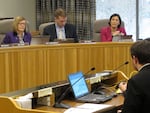Tobias Read’s political career in Oregon almost ended before it began.
In 2006, he and his wife wagered the results of his first legislative race on whether she would move to join him in Oregon, or if he’d leave the state to start fresh in California.
As a relatively young and unknown newcomer to House District 27, Read was a definite underdog in the race against a Ph.D.-holding engineer who had lived in the district upwards of two decades and previously chaired the local Democratic committee.

Oregon Treasurer Tobias Read, April 8, in Beaverton. Read is a Democratic candidate for the 2022 Oregon gubernatorial election.
Kristyna Wentz-Graff / OPB
Yet, by personally knocking on thousands of doors, he lost the election in Washington County — where he lives, and in which most of the district sat — but still won the primary by 86 votes.
And he went on to win the November race with nearly 60% of the vote. At 31, he became one of the state’s youngest lawmakers at the time and put down roots in Beaverton.
Sixteen years later, Read is out on a limb once again. In the race to be Oregon’s Democratic nominee, he’s the underdog despite a résumé that, in a different moment, would have made him a clear frontrunner.
Read’s problem: He faces a primary opponent in former House Speaker Tina Kotek who has more caché among progressive voters and groups that have come to dominate state primaries.
And in a time when the partisan divide is more pronounced than ever, it’s unclear whether the moderate approach he’s selling will unite voters or simply alienate both sides.
“Tobias is a great guy,” said Jennifer Williamson, a political consultant and former Oregon House Democratic Leader, who is supporting Kotek. “But he’s not the man of the moment.”
Read says his vision for Oregon and the approach he wants to bring to the state’s top job make him the right choice.
“The thing that continues to motivate me is what kind of a future we’re gonna leave to our kids,” he said. “I worry that we are losing the confidence of Oregonians based on the failures of government in the recent past.”
Paying privilege forward
At a time when many politicians are building their cases to voters on hardships they experienced, Read acknowledges he had a fairly idyllic upbringing.
He spent his childhood in a middle-class neighborhood of Boise, Idaho.

Oregon Treasurer Tobias Read coaches a girls basketball team in January 2022, in Beaverton. “I had parents who made it really clear that I was benefiting from people who came before me and invested in the future I was benefiting from,” Read said. “I have some responsibility to try and continue that tradition.”
Kristyna Wentz-Graff / OPB
Read says his mother, Heidi, an activist and educator, and his father, James, a psychologist, taught him to love the outdoors and worked hard to provide him with every opportunity available. It’s that normalcy Read is pitching to provide Oregonians.
“I had parents who made it really clear that I was benefiting from people who came before me and invested in the future I was benefiting from,” Read said. “I have some responsibility to try and continue that tradition.”
At 18, Read headed to Swarthmore College in Pennsylvania. Despite being a legacy student through multiple family members, he was unhappy, finding his fellow students more focused on beating their peers academically than connecting over shared interests.
After his freshman year, he transferred to the school that gave him the best feeling during a high school visit — Willamette University in Salem.
Wanting to give back to his community sparked an interest in politics, prompting him to join campaigns and staff for local lawmakers. He also rowed.
“Rowing is an entirely team-driven sport,” said Kevin Neely, a friend of Read’s from his college days and currently a vice president at Portland State University.
“So much of that characterizes Tobias for me. He’s happy to be in the center of the boat, pulling harder than anyone else, and then giving everybody else the credit for the win.”
After college, Read spent a couple years at Willamette working in the school’s athletic department to help bolster the rowing program. In 1999, he moved to Washington D.C. There he worked in the U.S. Treasury Department as executive assistant to Sheryl Sandberg, now COO of the company formerly known as Facebook, who at the time was chief of staff for then-Secretary of Treasury Lawrence Summers.
Read’s job was to put together Summers’ daily “briefing book” on what phone calls, meetings, speaking engagements and topics were on the schedule for the following day.
He says he’s fortunate to have had the opportunity, though he hasn’t maintained a particularly close relationship to Summers or Sandberg in the decades since. Read describes Summers as “brilliant,” though acknowledges his tendency to pose controversial questions sometimes got him into trouble publicly.
Read says Sandberg’s tutelage was formative, but he doesn’t count her as a close mentor. She has donated to his campaigns in years past, but not since 2016.
“There certainly are things about the way she’s taking things on that are influential that I look at and think about,” he said.
The experience at the federal government prompted him to return to the Pacific Northwest in 2001 to earn an MBA at the University of Washington. He says the degree served to help him understand how to marry the interests of private enterprise and government.
In 2002, he moved back to Salem to work briefly for a short-lived startup airline called SkyTaxi. He landed at Nike in 2004 working in shoe production; he helped prototype new products, manage production, figure out cost margins, oversee marketing and meet timelines for release.
Read won his first legislative race in 2006 and left Nike in 2012 to focus on his political career.
Assets and liabilities
Read describes himself as a “numbers guy,” and he acknowledges that can be a problem at times.
He’s quick to pull out statistics, quote dollar amounts and talk about complicated financial mechanisms, which illustrates his easy faculty with facts and figures, but can also make him somewhat hard to follow.

From left: Rep. Jules Bailey, Sen. Diane Rosenbaum, Rep. Tobias Read and Rep. Jessica Vega Pederson listen as state economists Josh Lehner, foreground left, and Mark McMullen discuss the quarterly revenue forecast at the state Capitol in Salem, Ore., on Friday, Feb. 15, 2013.
Jonathan J. Cooper / AP
As a lawmaker, Read’s voting record leans progressive. One of his biggest victories as a legislator came near the end of his tenure in 2015 when he led the charge to create full-day kindergarten. The state spent $110 million on more than 1,000 new all-day classrooms across Oregon.
As treasurer, a job he won in 2016, Read’s main function is to protect and grow investments made on behalf of the state’s public employee retirement system (PERS). He oversaw growth of assets owned by Oregon’s public retirees from $73 billion in 2017 to more than $100 billion in 2022.
The treasurer also administers programs that help Oregonians set aside money in other ways. The OregonSaves program, for example, allows people who aren’t offered retirement plans through their employer to start one through the state. The Oregon College Savings Plan helps parents invest in their child’s higher education from birth. Both have seen growth under Read.
“The treasurer has the ability to have a finger in a lot of different pies in a good way,” said Randall Edwards, who served as treasurer from 2001 to 2009.
But as important as the treasurer’s job is, it’s difficult to explain to voters. Only one politician in Oregon’s 163-year history, Bob Straub, has made the jump from treasury to the governor’s office.
Edward said the disconnect between the job’s clout and the practical experience it provides the holder doesn’t represent a fatal flaw in Read’s campaign. In fact, he thinks that Read’s footing puts him in a better position than someone like Kotek, whose record is more easily accessible and publicly scrutinized.
“It is a good place to launch from because, in some ways, flying low is OK,” he said. “Having the treasurer’s experience and knowing a lot about state budgeting and finances is a really good position.”
The treasurer’s office doesn’t typically attract headlines unless something is off. For example, state investments in fossil fuels, private prisons and immigrant detention centers have brought the attention of social justice and environmental groups who call on the state to divest.
The treasury puts money in the hands of managers who invest on behalf of the state. They have a legal obligation to make the best bets, and Read says it can be tricky directing them to divest in specific areas when the state’s portfolio is tied up in various holdings across the globe.
“We are sometimes invested in things we don’t like so much, but those are the trade-offs, and we have to keep our interests in benefiting the retirees at the forefront,” he said. “You don’t want a treasurer playing politics with people’s money.”
Read has resisted calls to divest from fossil fuels, but did send a joint letter with Oregon Attorney General Ellen Rosenblum in 2019 to two corporations that own immigrant detention centers, accusing them of violating their legal responsibility to safeguard Oregon’s investments by posing unsafe conditions for detainees. He’s also quick to note that the state’s portfolio in renewable energy has grown dramatically in recent years, from $50 million in 2014 to $800 million in 2021.
Read has faced a similarly sticky situation when it comes to protecting Oregon’s Common School Fund, a pot of education dollars filled by timber sales on the state’s nearly one million acres of state forest.
In 2017, he was the swing vote in deciding to sell the Elliott State Forest to a partnership between the Cow Creek Band of Umpqua Tribe of Indians and the Lone Rock Timber Company of Roseburg.
The 91,000-acre forest straddling Coos and Douglas counties is prime habitat for birds like the Northern spotted owl, marbled murrelet and fish such as coho.
The 2-1 decision by the state land board — which consists of the treasurer, secretary of state and governor — was controversial for taking the forest out of public hands. A court decision later found the sale unconstitutional.
Read ended up changing his position to advocate for a plan to keep the forest public by turning it into a research lab managed by Oregon State University.
He’s sensitive to criticism that he flip-flopped on the decision. During a Zoom interview, his voice rose uncharacteristically as he explained that his vote to sell came at a time when there was no other “viable” option on the table, and that it wasn’t his position that changed, rather the strategy the board used to get to its ultimate goal: protecting the state’s financial assets while preserving public ownership.
Sean Stevens, executive director of the environmental advocacy group Oregon Wild, said his organization has been generally happy with Read’s work on the forest’s future, and that the state treasurer should have the ability to change his mind as new information or options come to light.
“But it’s troubling that his first instinct was to sell rather than find a creative solution,” he said. “It’s fair that he should be able to evolve and change his mind, but leadership is going out and taking a tough situation and turning it into something positive.”
Read feels that’s exactly what he did.
“(The Elliott solution) is not what any one of us would have designed if we had to do it ourselves,” Read said. “But we’ve created something where everyone’s got buy-in.”
A pragmatic progressive
One of the more remarkable aspects of Read’s 16 years as an elected official is that he’s managed to make almost no personal enemies — even people who disagree with him ideologically find him likable.

Read has served 16 years in various positions for the state, including on the State Land Board with Oregon Secretary of State Dennis Richardson, left, and Gov. Kate Brown, center.
Cassandra Profita / OPB
U.S. Rep. Cliff Bentz, a Republican from Ontario, worked closely with Read when they were both legislators circa 2011, a time when power in the House was split evenly between Republicans and Democrats. The two co-chaired a transportation committee and held joint meetings with members who wanted to pitch ideas or make pleas for their bills.
Bentz describes Read as a “very sharp and thoughtful person.”
“And he works at it,” Bentz said. “He doesn’t expect everybody else to do his thinking for him.”
Former state Rep. Shawn Lindsay, a Republican from Washington County, served at the same time. He and Read were both on the House redistricting committee in 2011.
“We explicitly advocated opposing views,” Lindsay said, “but we vigorously disagreed, without being rude or angry.”
A similar trend exists within Read’s own party. He lacks enemies, but also — this race for governor has suggested — strong allies.
Five prominent colleagues, including former members of the Oregon Investment Council (which Read sits on) to current lawmakers, have politely refused to talk about Read’s candidacy.
Supporters and adversaries alike say Read is kind, generous and hard working. As a politician, they admire that he doesn’t wince at words like “compromise” or “incrementalism.”
It’s an atypical approach in an age marked by sharp divide. It’s also vastly different from the path Kotek has taken; her road to state leadership is strewn with remnants of battles that have occasionally brought the legislature to a standstill.
Kotek is sometimes portrayed as a ruthless and cunning operative; Read’s temperament is described as the opposite.

Oregon Treasurer Tobias Read, at a youth basketball practice in Beaverton, January 2022. If elected as governor, Read promises to improve access to quality, affordable childcare as a means to help parents re-enter the workforce, including establishing a universal Pre-K program statewide and investing in the state’s child care workforce.
Kristyna Wentz-Graff / OPB
Read’s friend Bakari Sellers, a CNN political analyst and retired South Carolina lawmaker, describes him as a “pragmatic progressive.”
Read’s attitude and approach recently landed him the endorsement of former Oregon Gov. Barbara Roberts.
“He’s not a showboat,” she said. “The way he operates is so calm, and strictly service-oriented.
“... Not everybody can be a Tom McCall, but that’s not necessarily what makes solid leadership.”
But Jennifer Williamson describes Read’s approach to politics as “Kitzhaber-esque,” meaning that he leans on Oregon’s institutions — councils, commissions, universities, banks and businesses — to find solutions. She says the style is reminiscent of former Gov. John Kitzhaber’s approach during his first two terms from 1995 to 2003.
In contrast, she sees Kotek, who she’s supporting, as someone who focuses on hearing from community groups, grassroots organizers and advocates.
Kitzhaber, who resigned as governor in 2015 amid allegations of ethical violations surrounding his then-fiance, Cylvia Hayes, recently endorsed Read.
In his endorsement, Kizthaber, said the state currently lacks a vision for where it wants to be a decade from now. He says Read can lead the conversation to find that vision.
Kevin Neely says Read’s mild-manner can be mistaken for dispassion. The two met while Read was working as a staffer for former Democratic state Rep. Bryan Johnston, a well-known and respected figure during the mid-1990s.
At the time, Read was getting just his start in politics as a student at Willamette.
Johnston’s work as a legislator and beyond gained him a reputation for being a “fixer,” someone who could work across party lines to solve problems. He quickly became Read’s north star.
“As I’ve watched Tobias progress in his career, that’s been a hallmark of his political engagement: really trying to bring people together and find common ground,” Neely said.
Dmitri Palmateer — Read’s friend, chief of staff at the treasury and one-time roommate at Willamette — says he and Read still think about how Johnston, who died in 2008, would approach problems they’re trying to solve.
He tells a story of when Read worked at Nike and met a Silverton-area farmer who was looking to set up a local food share program. The farmer was struggling to find clients; Read helped him work out the math so Nike employees could have fresh produce delivered weekly to the Beaverton campus.
“He has an eye for, ‘If I can marry these two people together and their interests, good things will happen,”’ Palmateer said.
Adding it up
In a different political era, Read’s credentials would likely have made him a clear front-runner to win the Democratic nomination.
But in 2022, his résumé and experience don’t add up in the same way.
Read doesn’t have the lived experience of struggling. A quaint, middle-class childhood in Idaho might not inspire Oregonians who are on the brink of homelessness or dealing with systemic inequities.
Two years removed from large-scale protests over racial justice and social equity in Portland and other cities, it’s never been more unfashionable to be running for office as a straight, middle-aged white man.
But allies such as state Rep. Janelle Bynum, D-Happy Valley, say identity shouldn’t matter.
She describes Read as an “honest broker” who grasps the complexity of issues the legislature and state are trying to address.
Bynum — a Black woman and business owner — has butted heads with Kotek on occasion. She recently accused Kotek of going back on a deal to support her bid for House speaker.
“I think Oregonians are smart,” Bynum said. “The time is right for any Oregonian, regardless of race or gender, to be able to put their name forward and be judged on the merit of their credentials.”
While Kotek paints herself as a fighter, Read is pitching the steady hand.
His first campaign ad didn’t mince words, claiming the state’s government has lost its way.
He blames that on a lack of execution and expediency – and has begun calling Kotek out personally. Read and Kotek are promising mostly the same things in terms of responding to Oregon’s top issue: both say they’ll invest more in homeless services, shelter capacity, and resources to address mental health and substance abuse.
But Read has said he won’t be shy in making tough decisions such as forcing people who refuse to accept help off the streets — a somewhat controversial take in line with the approach being pitched by the dark-money group People for Portland.
Both candidates say they support the development of more affordable housing, but while Kotek is honed in policy and advocacy, Read says he’ll use his business connections to incentivize the private sector to partner with the government.
He’ll take the same business-forward approach to addressing climate change by using incentives, he says, to change corporate behavior.
Read promises to improve access to quality, affordable childcare as a means to help parents re-enter the workforce, including establishing a universal Pre-K program statewide and investing in the state’s child care workforce.
On education, he takes a more hardline approach to keeping kids in classrooms through uncertainty such as public health emergencies. He wants to create a bullpen of substitute teachers and expand testing to avoid disruption.

“That’s the unique opportunity that the governor has not only to advance policies, but to follow through on them to execute on them," says Read. And he believes his experience puts him in a good position to succeed.
Kristyna Wentz-Graff / OPB
“I think we ought to aspire to make life better for our kids and measure our progress based on how well they’re doing,” Read said. “That’s the unique opportunity that the governor has not only to advance policies, but to follow through on them to execute on them.”
Kotek’s role as House Speaker saw her waist deep in policy and overseeing the approval of the state’s budget, but lawmakers have little recourse to oversee progress once laws are passed.
Execution falls on the governor’s shoulders and the agency heads they appoint to deliver on promises. Read believes his experience as both a legislator and state treasurer will translate to results when leading 45,000 employees and administering a $25 billion budget.
Until endorsements started to flow, Read’s biggest triumph in this race was arguably the inadvertent win handed to him by the Oregon Supreme Court when it ruled that former New York Times columnist Nicholas Kristof could not run for governor.
Read and Kristof were seeking the same pot of voters, offering themselves up as practical-minded moderates at a time in which polls show voter frustration with how policies around homelessness, mental health and addiction are working. Sheryl WuDunn, Kristof’s wife and also a former New York Times reporter, announced last week her endorsement of Read’s campaign.
For Read, the May vote will likely come down to whether he can connect with those voters who tend to show up in off-year Democratic primaries. He’s trying to convince an electorate that tends to lean even more progressive than Oregon as a whole that what he lacks in gusto, he makes up for in both vision and tact.
“It’s something that requires someone who has the experience, the temperament and the willingness to follow through,” he said. “I do think the experience I’ve had puts me in a good position for success.”
